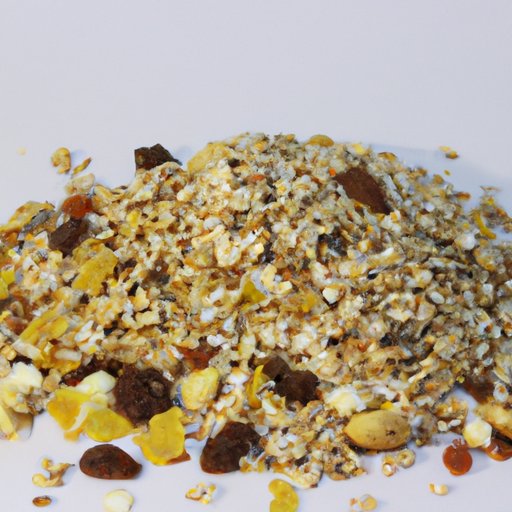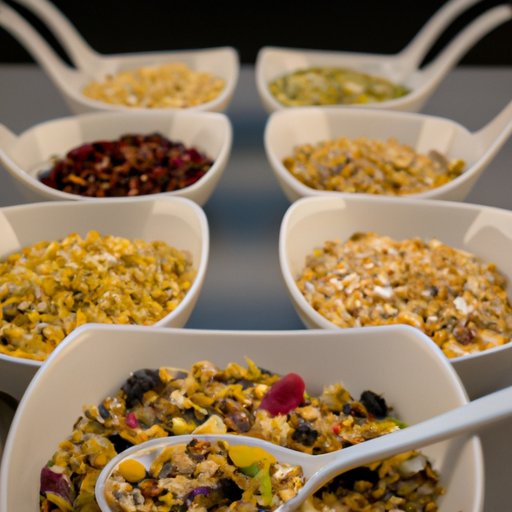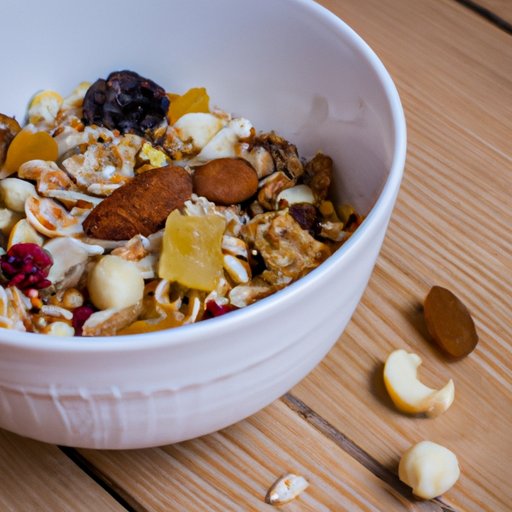Introduction
Muesli is a type of cereal made from oats, grains, nuts, seeds, and dried fruits. It originated in Switzerland in the early 1900s and has since become a popular breakfast item around the world. Muesli is known for its high fiber and nutrient content, as well as its versatility – it can be eaten dry, mixed with yogurt or milk, or used as a topping for baked goods. In this article, we’ll explore the nutritional content of muesli compared to other breakfast options, the health benefits of eating muesli, how to incorporate muesli into your diet, tips for making your own homemade muesli, different varieties of muesli, and an interview with a nutrition expert on the pros and cons of muesli.
Comparison of Nutritional Content of Muesli vs. Other Breakfast Options
Muesli is often considered a healthier alternative to traditional cereals. A single serving of muesli typically contains between 150-200 calories, depending on the ingredients. It is also high in fiber, containing 5-10 grams per serving. Additionally, muesli is rich in vitamins and minerals, including calcium, iron, zinc, magnesium, and B vitamins.
In comparison to other breakfast options, muesli is a healthier choice. According to registered dietitian Kristin Kirkpatrick, “Muesli is a better option than processed cereals because it’s higher in protein and fiber, and lower in sugar. It’s also a great source of antioxidants and phytonutrients, which can help protect against chronic disease.”

Health Benefits of Eating Muesli
In addition to its nutritional content, muesli provides several health benefits. Here are some of the main advantages of eating muesli:
Improved Digestion
Muesli is high in fiber, which helps to keep your digestive system regular and prevent constipation. According to a study published in the European Journal of Clinical Nutrition, increasing intake of dietary fiber can improve digestive health, reduce risk of colorectal cancer, and protect against heart disease.
Lower Cholesterol
Muesli is also a good source of soluble fiber, which can help lower cholesterol levels. Soluble fiber binds to cholesterol in the digestive tract and prevents it from being absorbed. A study published in the American Journal of Clinical Nutrition found that increasing intake of soluble fiber can reduce LDL (“bad”) cholesterol levels by up to 10%.
Rich in Nutrients
Muesli is packed with essential vitamins and minerals, including iron, zinc, and B vitamins. These nutrients are important for maintaining a healthy immune system and providing energy throughout the day. Additionally, muesli is a good source of protein, which helps build and repair muscle tissue.
How to Incorporate Muesli into Your Diet
Muesli is a versatile food that can be incorporated into your diet in a variety of ways. Here are some suggestions for adding muesli to your meals:
Substituting for Traditional Cereal
Muesli can easily be substituted for traditional cereals like corn flakes or granola. To make muesli for breakfast, simply mix 1/4 cup of muesli with 1/2 cup of milk or yogurt and a handful of fresh or dried fruit. You can also add a spoonful of honey or maple syrup for sweetness.
Adding to Smoothies or Yogurt
Muesli can also be added to smoothies or yogurt for a nutritious snack. Simply mix 1/4 cup of muesli with your favorite yogurt or smoothie ingredients and blend until smooth. This is a great way to get a boost of nutrients without having to prepare a full meal.
Using as a Topping for Baked Goods
Muesli can be used as a topping for muffins, pancakes, waffles, or other baked goods. Simply sprinkle a few tablespoons of muesli over the top of the batter before baking. This will give your baked goods an extra crunchy texture and a boost of nutrition.
Tips for Making Your Own Homemade Muesli
Making your own muesli is easy and allows you to customize the flavor and nutritional content to your liking. Here are some tips for making your own muesli at home:
Choosing the Right Ingredients
When making your own muesli, it’s important to choose the right ingredients. Start with a base of rolled oats, then add a variety of nuts, seeds, and dried fruits. You can also add spices like cinnamon or nutmeg for extra flavor. Choose organic ingredients whenever possible for the most nutrition.
Preparing the Muesli
Once you’ve gathered all of your ingredients, mix them together in a large bowl. Be sure to stir the mixture well so that all of the ingredients are evenly distributed. Once mixed, spread the muesli onto a baking sheet and bake in the oven at 350°F for 10-15 minutes, stirring occasionally, until the muesli is golden brown.
Storing the Muesli
Once the muesli has cooled completely, store it in an airtight container in a cool, dry place. The muesli will stay fresh for up to two months.

Exploring the Different Varieties of Muesli
There are many different types of muesli available, each with its own unique flavor and nutritional content. Here are some of the most common varieties of muesli:
Types of Grains
The base of muesli is usually made from oats, but other grains can also be used. Barley, wheat, rye, quinoa, and buckwheat are all common alternatives. Each grain has its own distinct flavor and nutritional profile, so experiment with different combinations to find what works best for you.
Different Fruits and Nuts
Muesli is typically made with a combination of dried fruits and nuts. Common additions include raisins, cranberries, almonds, walnuts, and hazelnuts. You can also add fresh fruits such as apples, bananas, or berries for more flavor and nutrition.
Sweeteners
If you prefer a sweeter muesli, you can add a small amount of honey, maple syrup, or agave nectar to the mixture. Alternatively, you can add a few tablespoons of dark chocolate chips or coconut flakes for a richer flavor.

Interview with a Nutrition Expert on the Pros and Cons of Muesli
To gain more insight into the benefits and drawbacks of muesli, we reached out to registered dietitian Amanda Kostro Miller. Here’s what she had to say about the pros and cons of eating muesli:
Benefits of Eating Muesli
“Muesli is a great breakfast option because it’s high in fiber and protein, both of which help keep you feeling full and energized throughout the day. Additionally, it’s a good source of vitamins and minerals that are important for overall health. And because it’s so versatile, you can customize it to fit your individual tastes and nutritional needs.”
Potential Drawbacks
“One potential downside of muesli is that it can be high in sugar if you don’t watch what you’re adding to it. For example, if you add sweetened dried fruits or chocolate chips, the sugar content can quickly add up. Additionally, some brands of muesli may contain added preservatives or artificial flavors, so it’s important to read labels carefully.”
Conclusion
Muesli is a nutritious and delicious breakfast option that can provide many health benefits. It is high in fiber and protein, and is rich in essential vitamins and minerals. Additionally, it is versatile and can be customized to fit individual tastes and nutritional needs. However, it is important to be aware of added sugars and preservatives when selecting a muesli brand. With these tips in mind, you can enjoy muesli as part of a healthy, balanced diet.
(Note: Is this article not meeting your expectations? Do you have knowledge or insights to share? Unlock new opportunities and expand your reach by joining our authors team. Click Registration to join us and share your expertise with our readers.)
